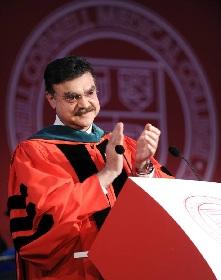Using AI to control energy for indoor agriculture
30 September 2024
Published online 1 July 2010

Last month, 17 students graduated from Weill Cornell Medical School in Qatar (WCMC-Q), becoming the institute's third graduating class. Ths group join the growing ranks of highly skilled graduates in the Middle East. Now the important question arises: is there a market for these highly-skilled graduates in the Arab world?
"I'm moving on to the United States for a residency at Weill Cornell Medical College in New York," said Muhamed Baljevic, one of the students who graduated. "After that I plan to apply for fellowship training in haematology."
Baljevic, who took a gap-year to pursue stem-cell research in New York three years ago, wants to return to this field one day. While the rules governing this type of research in the Arab world are less rigorous than in the US, there are hardly any institutions in the region that conduct this sophisticated research. WCMC-Q just established a stem cell research laboratory to rival its counterpart in New York, but it is still in its early days.
Brain drain is one of the most difficult challenges facing the region as it tries to re-establish a scientific culture. The best-trained and qualified researchers usually end up relocating to the West to pursue their careers in well-equipped and funded labs. Most of the students who have graduated from WCMC-Q are currently working in the US or Europe.
"We are reasonably confident that we will reverse brain drain",said Javaid Sheikh, permanent dean of WCMC-Q, who is convinced they university is on track to reverse this trend.
"We want to bring those students back by offering positions in our institute," he said. "This will be an opportunity for these students to be involved as mentors themselves."
Anas Abou-Ismail, another of this year's WCMC-Q graduation class, wants to return to Qatar after his residency at Vanderbilt University Medical Center in Tennessee, US.
"In terms of returning to the Middle East, I believe many of us always feel it is the way to go after we are done with our training. We want to come back to the region and help with the region, because it would be a shame if the people don't come back," said Abou-Ismail.
I would personally look for the opportunity to come back and contribute to the medical field and research field.
The scientific output of the Arab world is minimal, The number of papers published from the region amounts to less than 1% of the total scientific literature worldwide. Funding opportunities are limited and many labs are ill-equipped, lacking the tools essential for research. That is why the brightest researchers often opt for an opportunity to work in the West.
Sheikh acknowledges that it will not be easy to reverse a trend with roots that reach back several decades. However, he is confident that, if given the option, researchers would prefer staying in the Middle East. "I am back here now and many like me are here because our families are in this part of the world. We only left because we didn't have the opportunity to continue here."
The first step WCMC-Q will take is to establish residency programmes within the next three years. Afterwards they plan to offer faculty positions to their former students.
Another option open to students will be to work in Sidra Medical and Research Center in Education City, Qatar, the first international academic medical centre in the region, due to open its doors in 2012.
That way, graduates from the region can eventually get a chance to perform research as well as pursue their clinical work, without resorting to the West.
"But that doesn't happen overnight," warned Sheikh.

Abou-Ismail and Baljevic believe that there is good potential for research in the Middle East.
"The Middle Eastern population presents a good target for studies, that might be better here than in other places," said Abou-Ismail. "For example, during our research we were looking at the effects of breastfeeding on breast cancer. Given that the women in this region do more breastfeeding in their lifetime than in the US or Europe, we knew we will have better research."
This could also be an opportunity for collaborative research across borders. For example, Egypt, which has the highest prevalence of Hepatitis C in the world, has done much research on the disease. However, the standard of science may not equate with that in neighboring Qatar.
"I think when we have our research infrastructure in place here in Qatar, we would now need to look at neighboring countries as well," said Abou-Ismail.
Sheikh considers that research that serves the wider region could be the best strategy to retain researchers. "We have just recently established an international centre for diabetes and obesity research which will be expanded to metabolic syndromes, such as diabetes.
"Diabetes is pretty common here in Qatar and all over the Arab region and that is the need we are trying to focus on now," he added. He hopes that these baby steps will secure an interest and opportunity for researchers to stay put.
Abou-Ismail is confident that alumni of WCMC-Q will want to come back. "I had a chance to talk to many of our graduates from the two previous classes and a good number of them are interested in coming back to the broader Middle East."
"I would feel obligated to return to Qatar as much as I can. I would personally look for the opportunity to come back and contribute to the medical field and research field here in Qatar," added Baljevic.
With some of the best-equipped laboratories and research centres in the world being established in the region, and very generous government funding, there may finally be a chance to plug the brain drain. However, the problem was never solely about money. Until a research culture takes root, local researchers may still prefer to work in the West in an atmosphere sparkling with science and innovation.
doi:10.1038/nmiddleeast.2010.170
Stay connected: